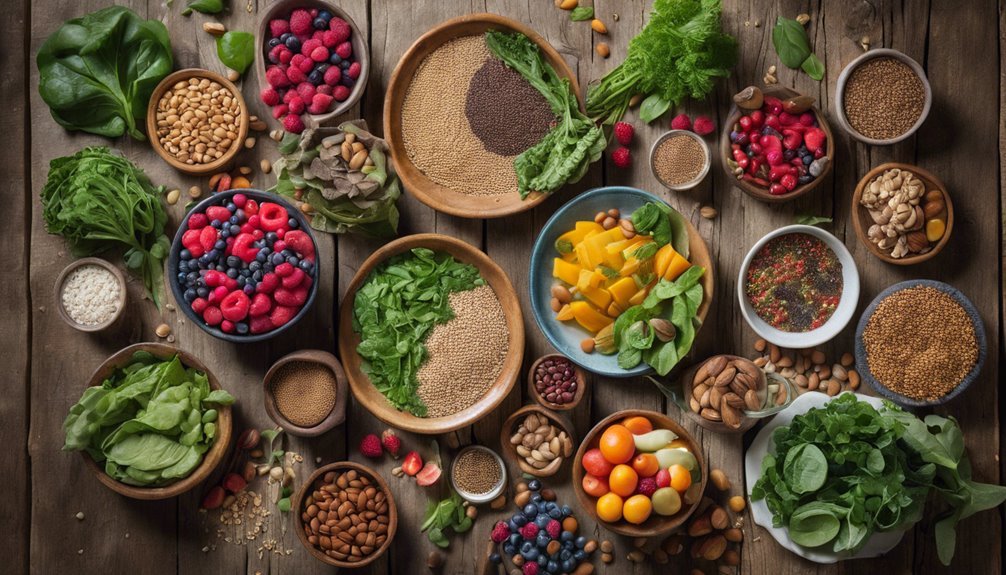"Cherishing Little Steps - A Haven for Baby and Family Journeys"
Best Diet Plans for Postpartum Weight Loss
Did you know that the timing of when you eat can be just as crucial as what you eat during your postpartum weight loss journey? It's not just about choosing the right foods; it's also about aligning your meals with your body's natural rhythms to optimize recovery and fat loss. As you navigate this new phase, you'll find that certain diets, like the Mediterranean or plant-based, offer not only nutrient density but also flexibility to suit your changing needs. But how do these diets specifically cater to your postpartum body, and what unique benefits can they offer? Let's explore how tailoring your nutrition can make a significant difference.
Key Takeaways
- The Mediterranean diet offers sustainable weight management with a focus on fresh fruits, vegetables, and healthy fats.
- Plant-based diets promote weight loss through high fiber intake and low-calorie plant foods.
- Low-carb diets help stabilize blood sugar and reduce cravings by emphasizing proteins and healthy fats.
- Incorporate frequent, small meals with a mix of protein, fats, and carbohydrates to boost metabolism and manage hunger.
- Meal planning and preparation prevent impulsive eating and ensure a balanced intake of nutrients.
Understanding Postpartum Nutrition
Why should postpartum nutrition matter to you? After childbirth, your body needs adequate nutrients to heal and regain strength. Focusing on nourishing meals isn't just about physical recovery; it's crucial for your mental well-being too.
Emotional eating can often surface as a response to the stress and exhaustion of caring for a newborn. By choosing foods that are rich in vitamins, minerals, and fiber, you can better manage mood swings and improve energy levels.
It's important to prioritize a balanced diet that includes a variety of nutrients. Protein, for instance, is essential for tissue repair and muscle recovery. Iron helps combat the fatigue many new mothers feel.
Calcium supports bone health, especially important if you're breastfeeding. Don't forget about the power of omega-3 fatty acids, which can enhance your mood and aid in the prevention of postpartum depression.
Mediterranean Diet Basics
You might find the Mediterranean diet particularly beneficial as you navigate the postpartum period. Emphasizing fresh fruits, vegetables, whole grains, nuts, and lean proteins, this diet is not only delicious but packed with nutrients essential for your recovery and well-being. The inclusion of healthy fats, primarily from olive oil and fish, supports hormonal balance and can enhance mood—a crucial aspect as you adjust to motherhood.
The Mediterranean diet is celebrated not just for its flavors but also for its health benefits, particularly heart health and weight management. This can be especially appealing when you're looking to shed pregnancy weight responsibly and sustainably.
Here's a simple guide to get you started:
| Food Group | Examples | Benefits |
|---|---|---|
| Fruits and Vegetables | Tomatoes, spinach | Rich in vitamins, antioxidants |
| Whole Grains | Quinoa, whole wheat bread | Fiber-rich, supports digestion |
| Proteins | Salmon, legumes | Builds muscle, repairs tissue |
| Healthy Fats | Olive oil, avocados | Supports hormone function, reduces inflammation |
| Nuts and Seeds | Almonds, flaxseeds | Heart-healthy, energy-boosting |
Incorporate these Mediterranean foods into your meals and experience the healthful Mediterranean benefits firsthand. Remember, balancing variety with moderation is key to enjoying and sustaining a healthy diet during this transformative period.
Plant-Based Diet Explained

Transitioning to a plant-based diet after pregnancy can be an excellent strategy for managing weight and boosting overall health. A plant-based diet focuses primarily on foods derived from plants, including vegetables, fruits, nuts, seeds, oils, whole grains, legumes, and beans. It doesn't necessarily mean you're vegan and never eat meat or dairy; rather, you're choosing more of your foods from plant sources.
Adopting a plant-based diet can help you shed postpartum weight through higher intakes of fiber, which aids in digestion and provides a feeling of fullness. This diet is rich in vitamins and minerals essential for recovery and overall well-being. Moreover, it includes high levels of antioxidants that help combat inflammation.
When planning your meals, consider:
- Diverse Sources of Plant Based Protein: Incorporate lentils, chickpeas, tofu, and quinoa to ensure adequate protein intake.
- Balanced Omega Fatty Acids: Include flaxseeds, walnuts, and algae-based supplements.
- Whole Foods Over Processed: Opt for whole grains and fresh produce rather than processed vegan foods which can be high in sugar and fat.
Vegan meal planning is crucial to ensure you're meeting all your nutritional needs, especially if you're breastfeeding.
Low-Carb Diets for Moms
While a plant-based diet offers numerous health benefits, exploring low-carb diets can also be an effective way for new moms to manage postpartum weight loss. Low-carb diets focus on reducing carbohydrate intake, favoring proteins and fats which can help you feel fuller longer and reduce those frequent hunger pangs. The low carb benefits aren't just about shedding pounds; they also help stabilize your blood sugar levels, which is crucial during the postpartum period.
When you're adjusting to the new demands of motherhood, meal prep can be a lifesaver. Preparing low-carb meals in advance ensures you have healthy options readily available, preventing the temptation to reach for quick, carb-heavy snacks. Here's a simple guide to get you started:
| Food Type | Examples |
|---|---|
| Proteins | Chicken, fish, tofu |
| Fats | Avocados, nuts, olive oil |
| Vegetables | Broccoli, spinach, kale |
| Dairy | Cheese, Greek yogurt |
| Snacks | Berries, seeds, low-carb bars |
Paleo Diet Overview

After exploring low-carb options, you might consider the Paleo diet as another effective approach to postpartum weight loss. The Paleo diet, grounded in paleo principles, emphasizes eating whole foods similar to what might've been eaten during the Paleolithic era. This means your diet would focus on lean meats, fish, fruits, vegetables, nuts, and seeds, while excluding processed foods, grains, and dairy.
The core idea is that modern eating habits are mismatched with our biology and that returning to the diet of our ancestors can improve health.
Here's why the Paleo diet might be particularly beneficial for you postpartum:
- Nutrient Density: Paleo recipes are rich in vitamins and minerals necessary for recovery and overall health.
- Natural Foods: Emphasizing whole foods helps eliminate additives and chemicals often found in processed foods.
- Weight Management: The high protein and fiber content can help regulate appetite and support sustained weight loss.
Meal Planning Tips
Understanding how to plan meals effectively is key as you adopt the Paleo diet for postpartum weight loss. Meal prep isn't just about saving time; it's about ensuring you're nourishing your body with the right types of foods to aid your recovery and weight loss goals.
Start by creating a weekly menu that includes a variety of proteins, vegetables, and healthy fats, which are staples in the Paleo diet. This not only helps in maintaining balance but also keeps your meals interesting.
When you go grocery shopping, stick to the outer aisles of the store where fresh produce, meats, and seafood are typically located. Avoid the temptation of processed foods by making a list based on your meal plan and sticking to it. This method not only supports your diet but also manages your budget effectively.
Consider preparing large batches of meals that can be refrigerated or frozen. This approach ensures you have healthy options readily available, preventing the likelihood of reaching for less nutritious alternatives.
Dedicating a few hours for meal prep each week can make daily meal decisions effortless and keep you on track with your Paleo diet objectives.
Importance of Hydration

Hydration often takes a backseat in postpartum care, yet it's crucial for both recovery and effective weight loss. After childbirth, your body needs more fluids to heal and return to its pre-pregnancy state. Keeping well-hydrated also helps to increase your metabolism, which can aid in shedding those extra pounds.
The hydration benefits extend beyond just drinking water. Incorporating water-rich foods into your diet not only boosts your hydration but also provides essential nutrients that aid in recovery and overall health. Here are some water-rich foods to include:
- Cucumbers
- Strawberries
- Lettuce
These foods aren't only high in water content but are also low in calories, making them an excellent choice for postpartum weight loss.
Remember, hydration isn't just about quenching thirst; it's a vital part of maintaining optimal bodily function and nourishment.
As you focus on your hydration, you'll likely notice improvements in your skin elasticity, energy levels, and overall well-being.
Snacking for Energy
As you maintain your hydration levels, consider the role of smart snacking in boosting your energy throughout the day. Healthy snacks aren't just about curbing hunger; they're crucial for sustaining your vitality and managing your weight postpartum. Mindful munching on nutrient-dense foods can significantly impact your overall health.
Start by focusing on snacks that are both satisfying and rich in nutrients. Options like Greek yogurt with berries, a handful of almonds, or slices of apple with peanut butter offer a great mix of proteins, fats, and carbohydrates, serving as potent energy boosters. These choices not only satisfy your hunger but also support your body's recovery.
Snack timing is also key. Eating small, frequent meals keeps your metabolism active and prevents energy dips. Incorporate portable options like homemade granola bars or quick recipes like a spinach and banana smoothie for energy on the go. Always practice portion control to avoid overeating.
Lastly, if you're preparing snacks for your kids too, choose options that are both adult and kid-friendly, like whole-grain crackers with hummus or veggie sticks. This strategy not only simplifies your meal prep but also helps you model healthy eating habits for your children.
Breastfeeding and Calorie Intake

Breastfeeding requires extra calories, as producing milk significantly boosts your energy needs. As you navigate this beautiful yet demanding phase of motherhood, it's crucial to balance your breastfeeding calories with your weight loss goals.
Typically, you might need about 300 to 500 additional calories per day to meet your nutrient needs while breastfeeding. These extra calories should come from nutrient-rich foods to support both your health and your baby's development.
When choosing foods to meet the increased calorie and nutrition demands, focus on:
- Whole grains: These provide essential B vitamins and iron, which are vital during the postpartum period.
- Lean proteins: Important for repairing and building tissues, proteins also help you feel full longer.
- Healthy fats: Sources like avocados, nuts, and olive oil contribute to your overall calorie intake and support your baby's brain development.
Supplements and Vitamins
While balancing your diet with whole grains, proteins, and healthy fats, you should also consider the role of supplements and vitamins in your postpartum recovery. After childbirth, your body needs extra nutrients to heal and return to its pre-pregnancy state. It's not just about losing weight; it's about nourishing your body.
Herbal supplements and specific vitamins can be pivotal in addressing any nutritional gaps you might encounter, especially when you're adjusting to a new diet routine. For instance, vitamin D and calcium are crucial for bone health, while iron can help prevent fatigue by combating anemia—a common postpartum issue.
However, it's important to consult with your healthcare provider before starting any new supplement regimen, especially if you're breastfeeding.
Furthermore, omega-3 fatty acids, often found in fish oil supplements, are beneficial for both emotional health and physical recovery. These fatty acids can support your mood and aid in the prevention of postpartum depression.
Lastly, don't overlook the potential for vitamin deficiencies. A blood test can reveal if you're deficient in crucial nutrients like B vitamins or magnesium, guiding your choices in supplements.
Balancing your diet with the right supplements and vitamins can significantly impact your overall well-being during this transformative period.
Avoiding Common Pitfalls

Navigating the journey of postpartum weight loss, you'll likely encounter several common pitfalls that can hinder your progress. Understanding these can empower you to overcome them effectively.
Firstly, self-sabotage strategies often creep in unconsciously. You might find yourself setting unreasonably high expectations or criticizing your progress harshly. Recognize that small, sustainable changes are more beneficial than drastic shifts that are hard to maintain.
Emotional eating is another significant challenge. Stress and lack of sleep, common in the postpartum period, can lead to seeking comfort in food. It's crucial to develop awareness of your eating triggers and find healthier ways to cope with emotions. Engaging in mild physical activity or seeking support from friends, family, or professionals can be very helpful.
To help you stay on track, consider these practical tips:
- Maintain a food diary to monitor eating habits and identify emotional eating patterns.
- Plan meals ahead to prevent impulsive, less nutritious choices.
- Stay hydrated and focus on nutrient-dense foods that support both your physical health and emotional well-being.
Setting Realistic Goals
Most new mothers find setting realistic goals crucial for successful postpartum weight loss.
It's important to understand that your body needs time to recover from childbirth. Establishing realistic expectations not only helps you stay motivated but also ensures that you're giving your body the nutrients it needs to heal. Gradual progress is the key, rather than drastic changes that mightn't be sustainable.
Start by focusing on nutrient-rich foods that support both your health and your baby's, if you're breastfeeding.
Foods high in fiber, protein, and healthy fats can help you feel full longer and provide the energy you need. Instead of setting a strict timeline for weight loss, aim for smaller, manageable changes to your diet and activity level.
Frequently Asked Questions
How Does Sleep Affect Postpartum Weight Loss?
Sleep significantly impacts your postpartum weight loss. Sleep deprivation can disrupt hormonal balances, particularly increasing cortisol levels, which may hinder weight loss efforts.
Adequate sleep supports your metabolism and helps regulate appetite-controlling hormones like ghrelin and leptin.
Prioritizing good sleep hygiene can enhance your overall well-being and assist in managing weight effectively.
Can Yoga Help in Postpartum Weight Reduction?
Yes, yoga can definitely aid in your postpartum weight reduction.
Incorporating yoga benefits your overall postpartum fitness by improving flexibility, strengthening core muscles, and reducing stress. It's a gentle way to ease back into exercise and supports mental health too.
Make sure you're combining yoga with a balanced diet rich in nutrients. This holistic approach not only helps you serve your family better but also enhances your personal well-being.
What Are the Effects of Stress on Postpartum Weight?
Stress can significantly impact your postpartum weight. When you're stressed, your body may crave more food, leading to emotional eating, which can hinder weight loss efforts.
Managing stress through techniques like mindfulness or yoga can help regulate these cravings. Additionally, stress affects hormone levels, which might also contribute to weight retention.
Prioritizing stress management can support your overall health and make it easier to return to a healthy weight.
How Long After Delivery Should I Start Exercising?
You might feel like it'll take forever, but generally, you can start light exercises as early as a few weeks after delivery, once your doctor gives the green light.
During postpartum recovery, begin with low exercise intensity, focusing on gentle movements. This approach ensures a balanced recovery and gradually rebuilds your strength.
Are There Any Quick, Safe Weight Loss Programs for New Moms?
You're likely eager to find quick diets and safe programs for shedding weight post-baby.
While rapid weight loss might seem appealing, it's crucial to prioritize health.
Opt for nutrient-rich, balanced diets that support both healing and milk production if breastfeeding.
Gradual weight loss through a combination of wholesome eating and moderate exercise is often most effective and sustainable.
Conclusion
As you navigate the postpartum journey, remember that the right diet is your stepping stone to wellness. Embrace the Mediterranean or plant-based diets for heart health and sustainable energy, or consider low-carb options to stabilize your sweet cravings. Alongside mindful eating, don't forget to fuel up with essential nutrients and set achievable goals. Like planting a garden, cultivating your postpartum health takes patience and care, but the blooms of well-being are worth the effort.




